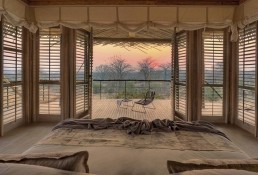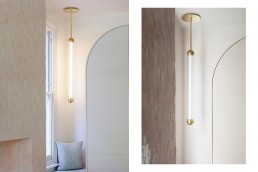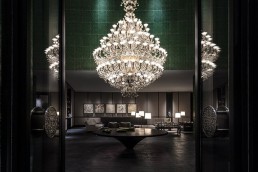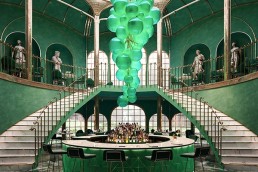Review: Jabali Ridge & Private House
The rugged, shrub-filled landscape of Tanzania forms the inspiration for Asilia’s newest luxury safari lodge in the heart of Ruaha National Park.
Two huge baobabs stand sentinel at the entrance to Jabali Ridge, a towering reminder that here, nature is king. It’s something Johannesburg-based Nicholas Plewman Architects had to bear in mind when set the task of designing the eight-suite lodge, cognisant that they must build around the colossal granite boulders that sit stubbornly on the site in south Tanzania’s Ruaha National Park. “The idea was to work around the shadows of the giant boulders but keep the roofs flat so that the elevation would never compete or clash with them,” says the studio’s founder, Nicholas Plewman. “The boulders provide an extraordinary magic and majesty, but they also posed a problem; if our buildings occluded them, the site would be lost, so we had to be very careful with placement and scale.” Of course, they also presented challenges when it came to squeezing eight rooms within the irregular site, and bringing in services like water and power, but the end result is an impressive, earthy-looking property that appears to emerge from the surrounding landscape.
Surrounded by lala palms, bush willows and tangles of mauve and lavender wildflowers, Jabali Ridge – Jabali meaning ‘rock’ in Swahili – occupies a unique spot overlooking the craggy landscape of Tanzania’s largest national park, which is home to 10% of the world’s remaining lion population yet receives only half the visitors of the better-known Serengeti to the north. While the lodge opened in September 2017, work has just completed on Jabali Private House, an exclusive-use villa, and the only private house on the southern safari circuit, set 200m away from the main camp. With two private entrances, a huge baobab at its centre and a veranda snaking around the exterior, the property accommodates groups of six to eight in its three spacious en-suite bedrooms. There’s also a private pool, chef, butler, housekeeper and safari guide on-hand for whenever the desire for a lazy al fresco barbecue or after-dark game drive strikes.

Both the lodge and private house share the same rustic outside-in aesthetic, with huge, vertiginously-perched boulders and thick leafy vegetation used in place of walls. The lodge’s communal spaces – comprising a dining area, lounge and bar – open up to a spectacular series of stilted pergolas made from Indian teak and phragmites harvested from the Ruaha River. It’s the perfect spot from which to take in the sweeping views of the reserve, or spy giraffes and elephants as they saunter by.
Expect hearty yet simple dishes from the open-sided dining room – aubergine lasagne, tender beef curry, grilled meats and salads – and some serious design inspiration from the breezy seating area. All furniture, as well as the smattering of decorative African objects that festoon the property, have been sourced by Caline Williams-Wynn of Artichoke Design – the team behind Rwanda’s Bisate Lodge and the new Mombo camp in Botswana. “We chose to use an eclectic selection of Afro-centric custom-made furniture for Jabali,” says Williams-Wynn, speaking of the wicker stools, driftwood tables and bird’s nest chairs that consolidate Jabali’s laid-back earthy aesthetic. “We wanted to ensure that appreciation was given to the surroundings. The impressive boulders that epitomise the topography of the area provided inspiration for the project as a whole, so curves and circles became obvious in many of the furnishings and finishes.”

The lodge’s eight suites – some with their own hammocks and outdoor showers but all with distinctive nest-like roofs – are reached via a series of meandering rocky paths, so it’s not uncommon to hear the rustle of a nosy hyrax or the scuttle of an inquisitive lizard as you pass by.
According to Plewman, each room also takes nature as its focus. “The starting point was that the ideal room would be no room at all, just the deep shelter of a boulder or baobab,” he says. “We tried to get our rooms as close to that as possible, while creating a luxurious and safe environment.” Natural fabrics are also key. “A great deal of emphasis was placed on textures, natural products, and organic subjects,” says Williams-Wynn. “The bed throws and cushions for example, were made using linen wrapped in eucalyptus leaves and immersed in vegetable dye. The process resulted in a perfect simulation of the bleeding boulders outside.”

Studded wooden doors and satisfyingly chunky bed frames are manufactured from aged timber – the beds are actually crafted out of old dhow boats, each taking 18 men to haul it to its proper position – while curved putty and slate grey walls are designed to represent the trunks of the ancient baobabs that dot Ruaha’s landscape. Palm-woven matting, sourced from Zanzibar, is used on the ceiling to keep the room cool, and the harsh climate is kept at bay by timber louvered shutters that were handmade in Bali. Each room also has a private balcony, wraparound deck and an open air seating area filled with pillowy throw cushions. Sweetest of all is a small serving hatch through which staff deliver fresh Tanzanian coffee and ginger biscuits before your early morning safari.
On return from a sweaty game drive with one of Jabali’s superb guides, guests can also make use of impossibly photogenic rim-flow infinity pool, as well as the nearby single-treatment room spa. And what better than to settle down to a full-body baobab oil massage, as the sound of the bush floats lazily by.
Words: Lizzie Pook
Photography: Courtesy of Asilia
This article originally ran in Sleeper 79 (July/August 2018)
Related Posts
19 November 2018
Cameron House Design collaborates with 2LG Studio
4 October 2018
REVIEW: The Middle House
16 July 2018




